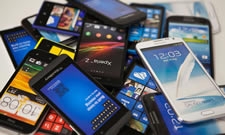By Jacqueline Detwiler.
 591_tWe used to love smartphones.
591_tWe used to love smartphones.
We used to wait in line for them and dress them up in pretty cases and show them off to our friends.
Many of us still do, but things seem … different.
People are using words like invasive, co-dependent, junkies, addiction — serious language meant to suggest our total submission.
In the past six months, a backlash against smartphones has arisen from all corners of the globe.
“Last year was a pivotal year in our relationship with technology,” says author Arianna Huffington, who in January released an app called Thrive, in partnership with Samsung, that temporarily halts phone notifications.
“For many, the unfolding story of how technology was used to undermine our elections served as a wake-up call.”
“But there’s a wider story that had been bubbling up in the zeitgeist for a few years, as technology accelerated the pace of our lives and has made it seem like we were living in service of our devices rather than leveraging tools to make our lives better.”
In January, Jana Partners, a private equity firm and one of Apple’s largest shareholders, co-wrote a letter to Apple demanding that the company help parents mitigate the effects of smartphone use on children.
Charles Penner, from Jana Partners, told us, “Popular perceptions of technology are changing for the worse.”
“Risks that people used to think are theoretical are starting to show up in real ways.”
More than 600 schools across the US are using Yondr cases, neoprene pouches that temporarily lock phones away using a mechanism somewhat like those old shoplifting-deterrent tags.
Last year, Nokia re-released the dumbphone it first put out in the year 2000.
It sold out in a week.
And in December, Facebook (Facebook!) pledged $1 million toward studying the relationship between media technologies and wellbeing.
Why the (relatively) sudden demonisation of everybody’s favourite appendage?
In looking for an answer, my first stop was science — I called a bunch of researchers and asked if there was any hard evidence that might have suddenly swayed public opinion.
“I can’t think of a single study that compellingly demonstrates that this has somehow changed our brain,” says Jason Chein, an associate professor of psychology at Temple University.
Psychiatry professor Lindsay Squeglia runs the Mobile Technology Workgroup for the Adolescent Brain Cognitive Development (ABCD) study, which promises to be the largest longitudinal study of brain development and child health ever undertaken in the US.
Researchers have been enrolling 10,000 nine to 10-year-olds since late 2016 and will follow them for a decade to determine how social media and smartphone use, along with a host of other factors, affects academic achievement, emotional functioning, and brain development.
“It’s flashy to say that this is ruining our kids’ trajectories, and it always gets you on the front page of the paper, or on the Today show,” Squeglia says.
“I take a much more unbiased approach.”
“It always ends up somewhere in the middle, right?”
Indeed.
Scientists are studying mobile addiction feverishly, but there is not one sweeping conclusion I could point to as the cause of the backlash.
It’s all interesting, though: one study published last year found that the further away a student’s smartphone was during tests of working memory and fluid intelligence, the better they performed — even though the phones were on silent and the students reported not thinking about them at all.
Others have found that conversations held in the absence of smartphones are overall better, and that taking a photo of a piece of art reduces the likelihood that you’ll remember it later.
And yet: in 2016, Dutch researchers Helen Vossen and Patti Valkenburg found correlations between heavier social media use and increased empathy in preteens.
And a 2012 paper by Chinese researchers found that people who multitask with lots of different media might make faster, smarter subconscious decisions about their environment.
So, early conclusion: science is not behind the backlash.
It’s important to remember, though, that science sometimes takes a long time to figure out exactly how humans are screwing ourselves up.
Our collective feeling of unease about smartphones probably stems from something real.
Eventually, the ABCD study could give us some evidence.
The kids come in for annual brain scans, interviews, and tests of memory and attention.
“We collect DNA to look at genetic influences, and saliva samples for hormone analyses,” Squeglia says.
In the end, we may find out that smartphones are the new comic books, terrifying older generations with their newfangled unseriousness.
Or we may learn that smartphones are the sugar of social interactions, undermining our mental health in unprecedented ways.
Probably both.
For now, technology companies, on trial in the court of popular opinion, are offering preemptive solutions.
According to Mark Zuckerberg’s earnings call for the last quarter of 2017, Facebook is showing “fewer viral videos to make sure people’s time is well spent, reducing time spent on Facebook by roughly 50 million hours every day.”
Apple has promised to release new, more “robust” parental controls.
Meanwhile, 40 per cent of Norwegian students are using an app called Hold, which offers rewards for not checking your phone.
American popular culture has an incredible way of backlashing itself into a (mostly) stable equilibrium — one in which companies sell more stuff, and society doesn’t fall apart.
For now, it’s encouraging to know that the public can still gall manufacturers into serving our best interests, even if we’re not quite sure what those are, because, by the time we reach a future that includes automated cars and augmented reality, we may look back fondly on the simpler years of the late 2010s, when all we had to contend with were hand computers.
* Jacqueline Detwiler is Articles Editor at Popular Mechanics. She tweets at @jacquidetwiler.
This article first appeared at www.popularmechanics.com.











